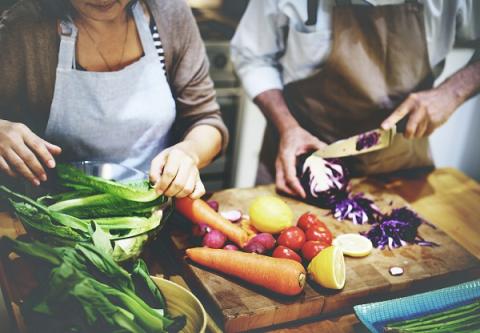
1
Be 'Food Safe' When Grilling Outdoors
Before any cookout, grill masters should consider the following basic food safety tips, courtesy of Chris Wicker, DeCA's public health advisor:
- Be clean. Before cooking or eating – and definitely after using the bathroom – wash your hands with soap and water for at least 20 seconds. Don't forget the grill; it should also be cleaned before preparation begins.
- Separate the food. Keep raw food apart from cooked food. The juices from raw meats can contain bacteria that could transfer to other foods. That means use separate plates or containers for raw meat, poultry or seafood when moving food to the grill and different containers entirely for the cooked products unless the carriers have been washed thoroughly in soap and water. Also, keep cooking utensils and cooking surfaces clean from potential cross contamination.
- Marinate in refrigerator. Any food that is marinating should be covered and kept in a refrigerator until ready to cook. Also, don't reuse marinade containing raw meat.
- Cook it completely. This means you cannot take shortcuts on the amount of time it takes to thoroughly cook meat. Use a food thermometer to ensure meat is ready to eat. For example, ground beef and pork should be cooked at 160 F, chicken at 165 F and steaks and roast at 145 F. For shrimp, lobster and crab, cook until pearly and opaque. You can use your microwave, oven or stove to precook the food immediately before placing it on the grill.
- Chill and freeze – immediately. Food should never be off the grill or out of the cooler for more than two hours. And, when the outside temperature is hotter than 90 F, food can only be left out for an hour.
- Hot, hot, hot. Keep hot food wrapped, insulated in a container and at or above 140 F. Eat hot take-out food within two hours of purchase. When reheating food on the grill, make sure it reaches 165 F.
- Keep it cold. If it's meant to be cold, it needs to stay that way at or below 40 F. Chicken salad, potato salads, bagged and green salads, and certain desserts must be protected from warm temperatures by placing them on ice in coolers. Remember to drain the water from melted ice in those coolers and replace ice as necessary.
Food Recalls
For additional information on food recalls for your food safety, head to the Food Recalls area below.
Other Resources:
